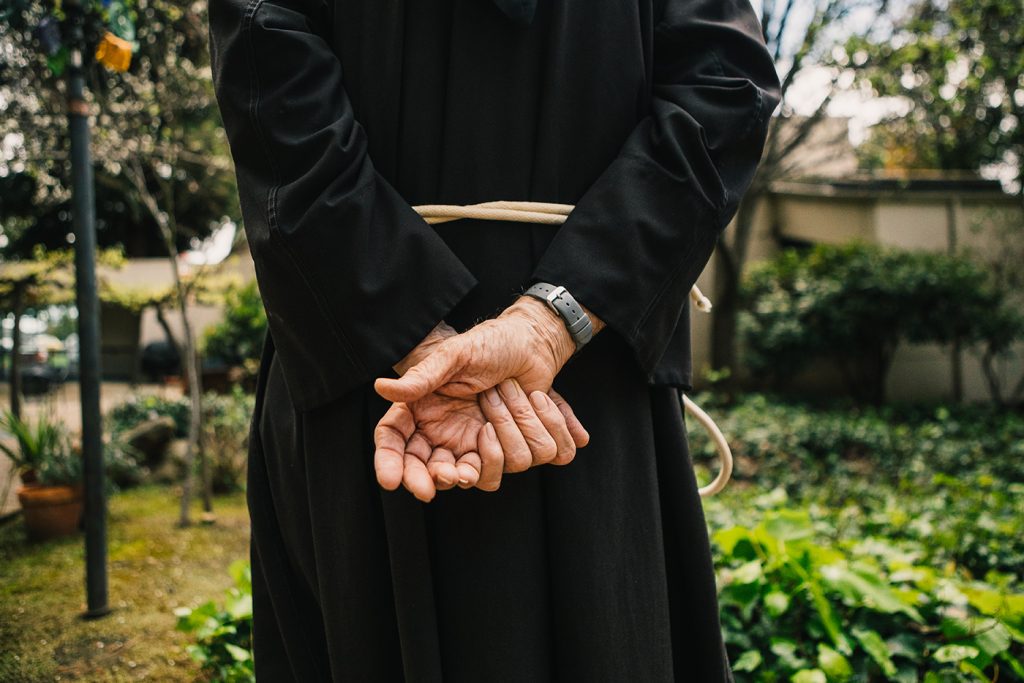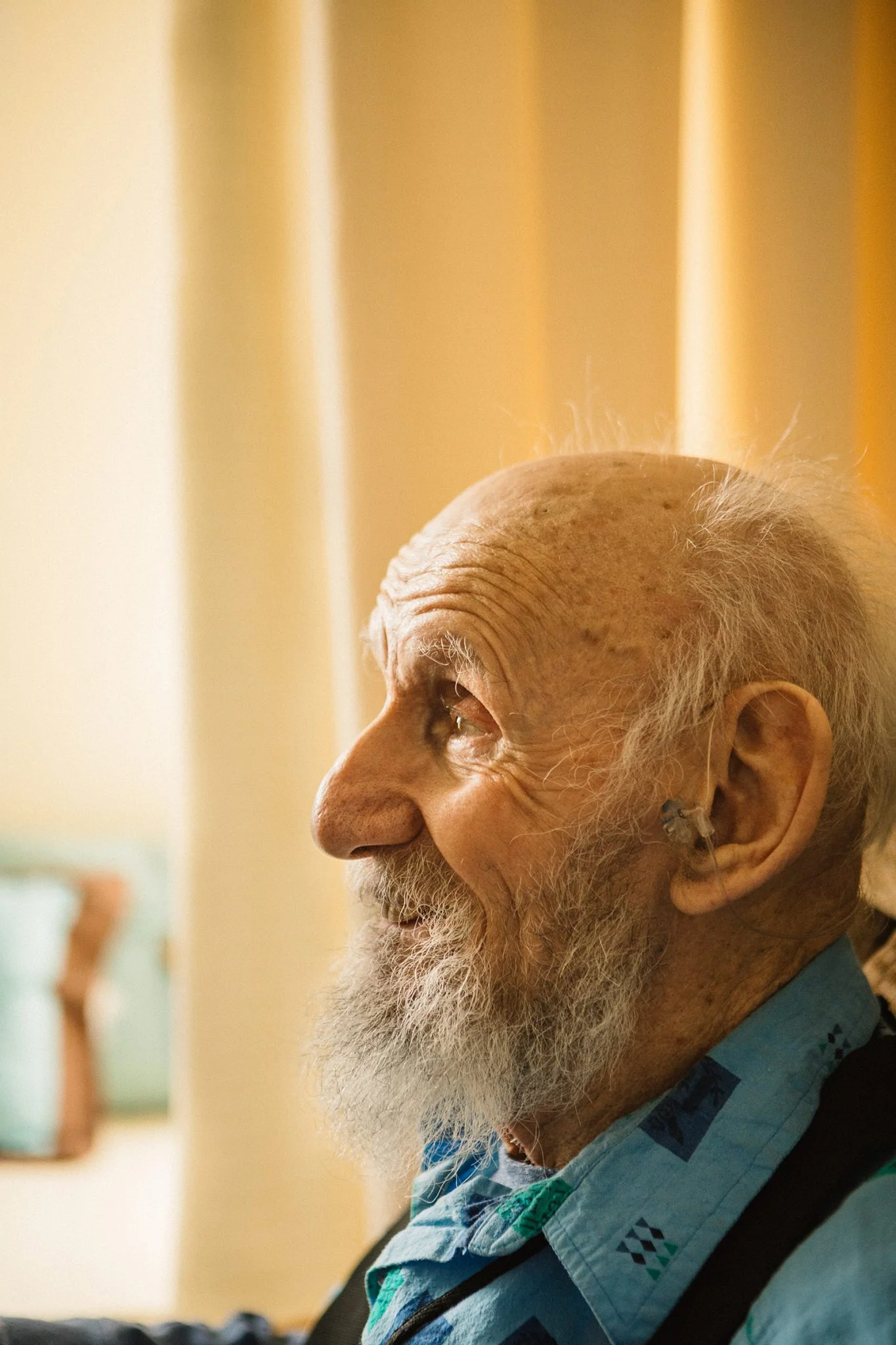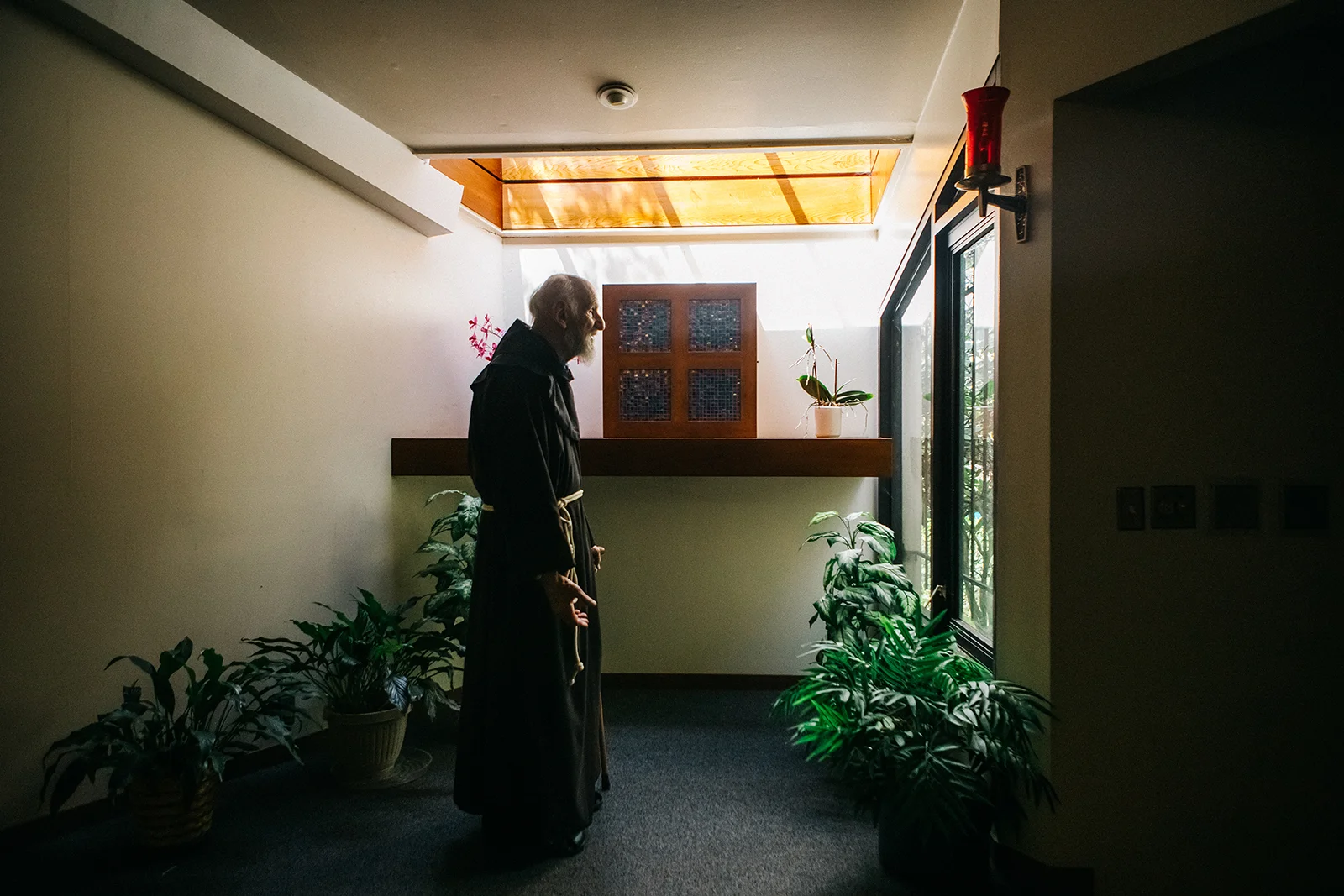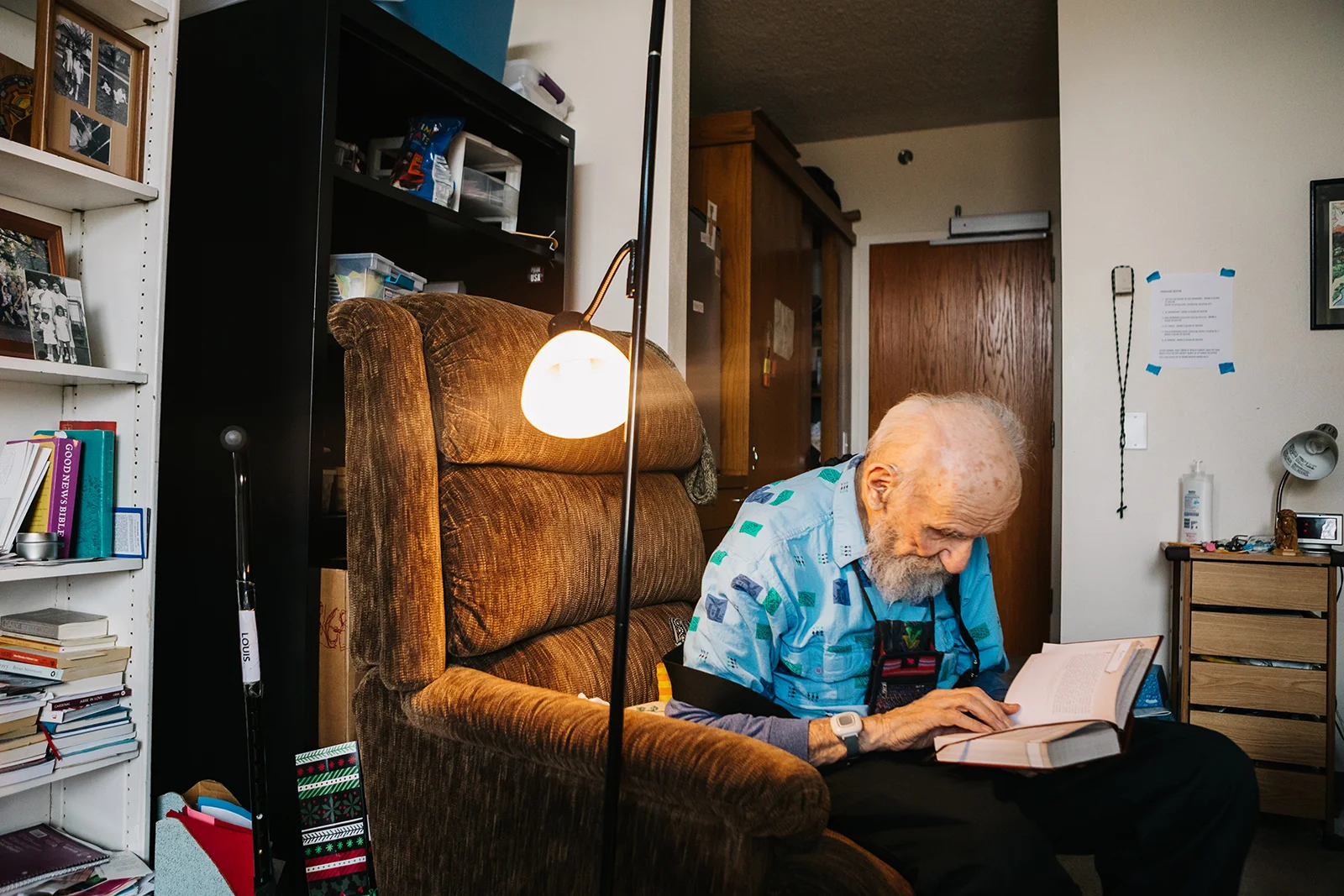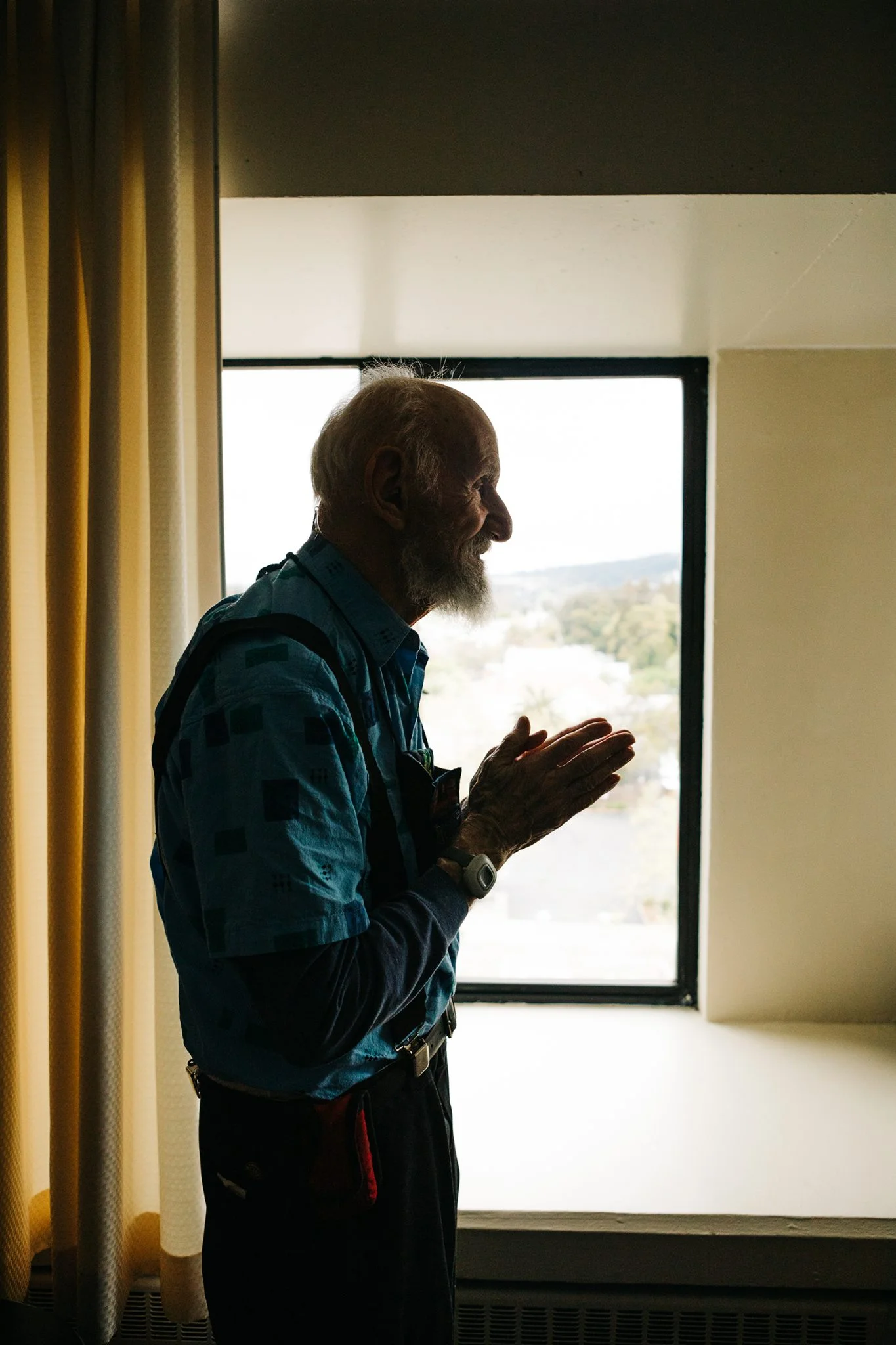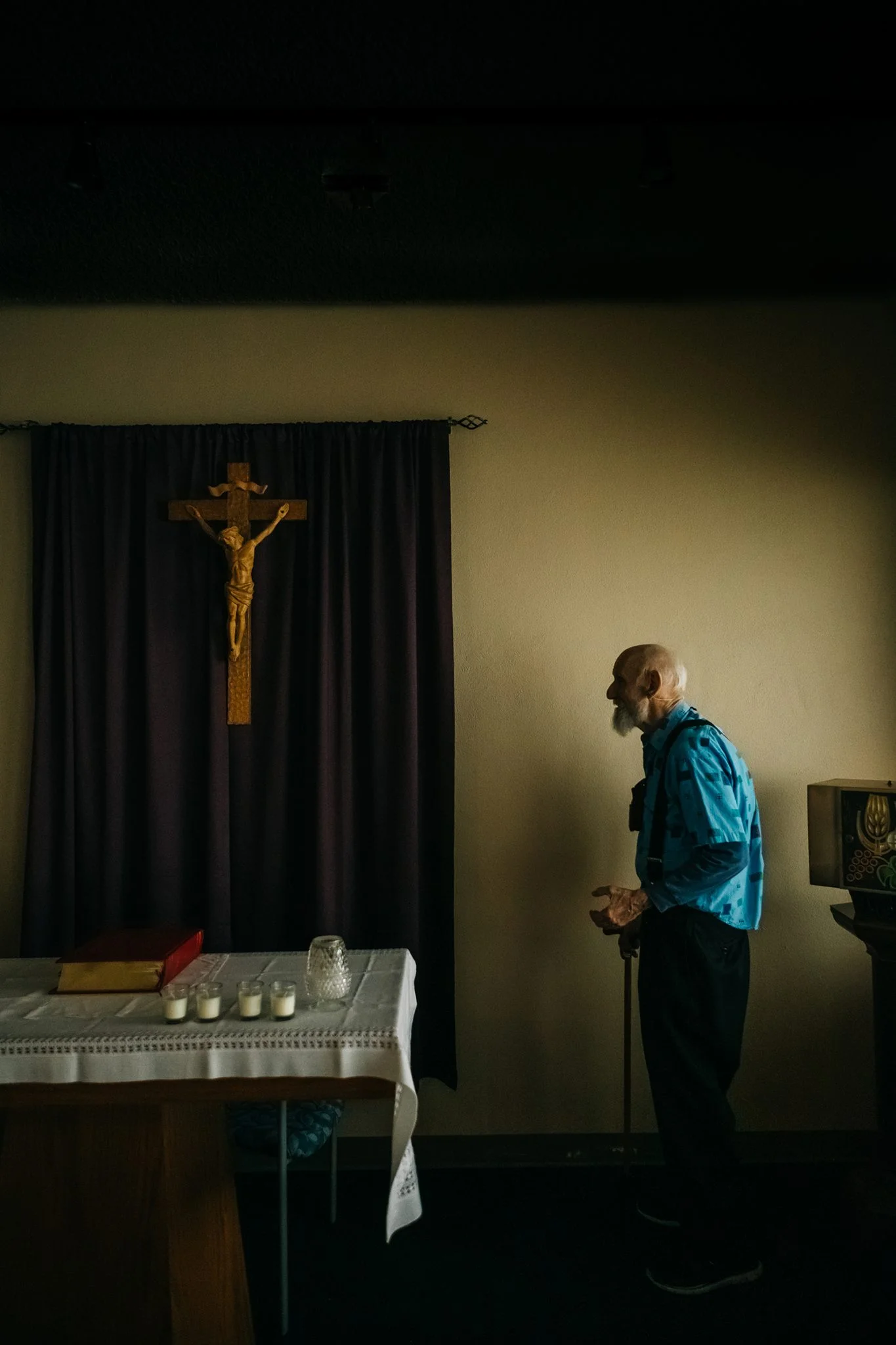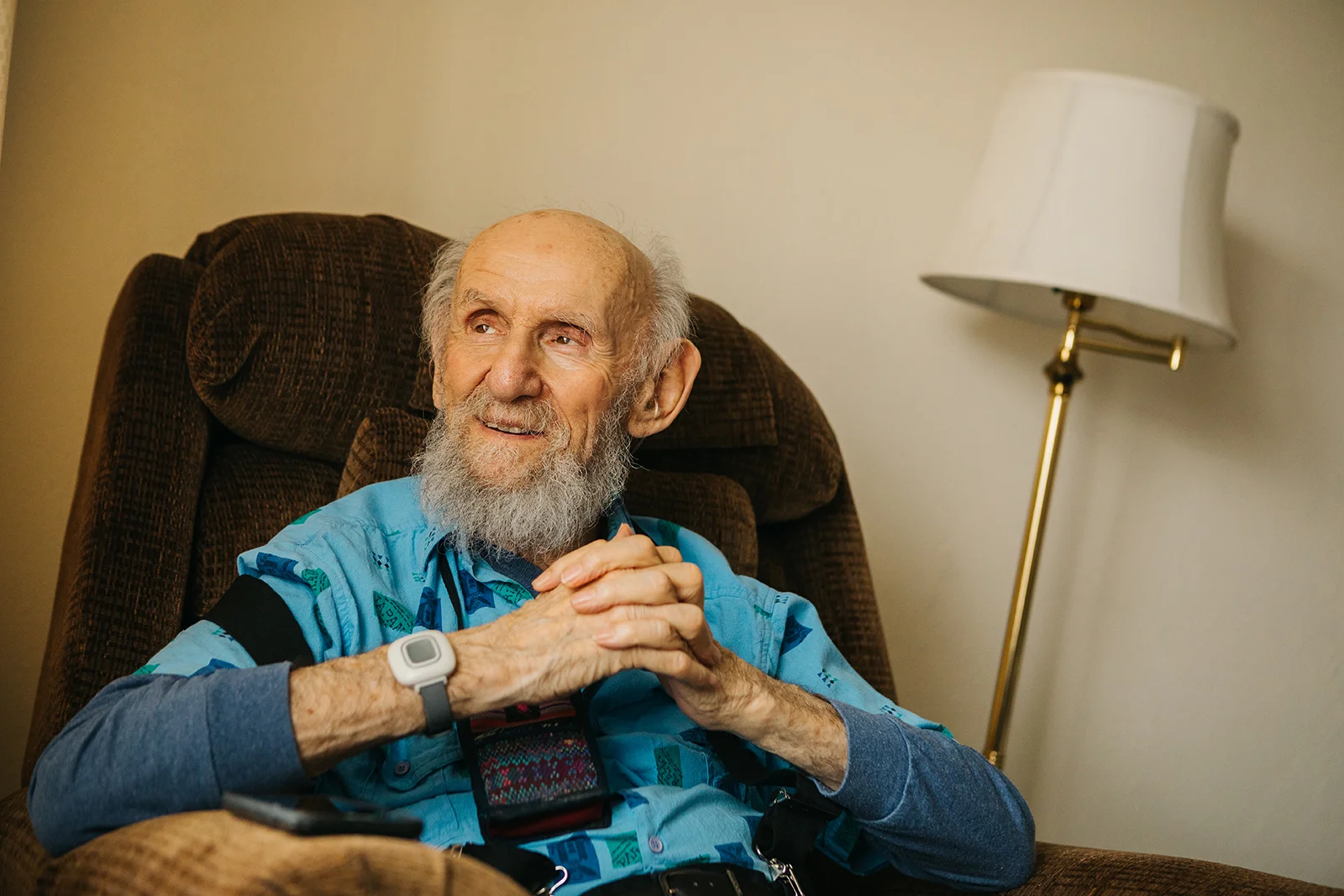Evangelization of Peace: The Radical Life of Father Louis Vitale
Article and photos by Ryan Devisser. Reposted with permission from Nations.
Friar Louie is the co-founder of Pace e Bene Nonviolence Service.
May 14, 2019
Most families have that ‘crazy uncle’ or relative who stands out at gatherings. My brown-robed great-uncle Father Louis Vitale embodies that role in my family. Growing up, I remember the phone calls informing our family of Fr. Vitale’s next imprisonment. Throughout his life, his radical focus on justice through nonviolence led him to over 400 arrests for civil disobedience.
Since taking his vows as a Franciscan priest in 1960, Vitale has served as a fearless advocate within the Catholic Church for peace and betterment of the poor and homeless. Vitale and I could usually be found in a quiet corner of family Christmas parties going back-and-forth about our faith, if he was not in prison that year. His radical activism and keen awareness of the issues facing humanity always drew me in.
As I drove up the flower-coated hills of Central California to interview Vitale, I reflected on the man I had known for years. Five years had passed since we last met at my grandmother’s funeral. Following years of activism and subsequent jail time, Vitale is now living in an Oakland retirement home for Catholic clergy. Over the phone before our in-person interview, he repeatedly warned me that he couldn’t speak as clearly as he once had.
Passing a plethora of Mexican markets and Chinese restaurants in the Fruitvale neighborhood of Oakland, I parked in front of the concrete-colored Mercy Retirement & Care Center. Greeting me with a big smile and chuckle, Vitale’s eyes sparkled with a comforting aura. Wearing a monk’s garb, he stood tall and thin with his signature light-hearted sense of humor. (Throughout his life, Vitale fasted extensively and ate a vegetarian diet.)
The jovial Franciscan did not always live under the vows of life of poverty, chastity, and obedience. In his senior year of high school, Vitale was engaged, with sights set on a lucrative future in the family seafood business. He described a lifestyle of partying and taking women on dates in fancy cars.
“It was such a possible, glowing future and I had always yearned for that typical American dream,” he recalls. “It was tied together with an Italian [mindset]: go into business, have a family, and do all those things. It’s funny how things fall apart. On the other hand, Jesus moved in.”
Following his commitment to ROTC in college, Vitale enlisted in the Air Force shortly after the Korean War ended. At the time, the Cold War was beginning. Two global hegemonic powers, Russia and the United States, stood on the brink of all-out nuclear conflict on a weekly basis.
At the time, many American leaders were on edge about a Russian attack from the air. Though he didn’t have the eyes to be a pilot, Vitale’s main role in the Air Force was that of an intercept officer. His role kept him in charge of equipment handling and radio communications on various aircrafts.
“It’s funny how things fall apart. On the other hand, Jesus moved in.”
One Sunday morning, Vitale’s crew received a call that would change his outlook forever. U.S. command central had been tracking a suspected Russian aircraft since early dawn. As the supposed enemy crossed the northern pole, Vitale’s fighter jet was sent to intercept the aircraft.
“Being my impetuous self, I peeked up and looked out…it was an American airliner,” Vitale says. “I had a missile locked on to an American airliner, and it was counting down to launch.” Fortunately, the adept pilot dipped the nose of the jet, unlocking the target, and narrowly avoided what could have been a national tragedy.
This close encounter illuminated the destructive power of weapons on Vitale’s conscience. He suffered from PTSD following his service and describes having nightmares about the incident for the rest of his life.
Toward the end of his time at the Air Force, Vitale saw a shiny Jaguar XK140 on display at the local dealership. He bought the car with some war bonds he had saved up and drove across country. But the car and freedom didn’t have the effect he hoped for. “By the time I drove the roadster back to the base, I felt a sense that this was really not nirvana,” he admits.
Raised in a Catholic family, Vitale had been drawn to faith and religious devotion throughout his life. During his time in the Air Force, he occasionally stopped by church on his drive back from the base. “We organized a choir at the chapel on base and then somebody brought up the idea of going on a retreat.” With some friends, Vitale went on a retreat at Abbey of Gethsemani, a trappist monastery where renowned Catholic monk Thomas Merton lived. “I began thinking about joining the priesthood, but I was scared to death,” he says.
Despite his first-generation Italian-American father’s priming to run the family seafood business, Vitale made the decision to join the Franciscan order. His father was at a business convention in Chicago when Vitale made the difficult call to his father’s hotel room.
“My dad got all upset and said that everything I had ever worked for would go away, and that I would be letting him down,” says Vitale. “That was hard. There were some long years of trying to work through that with him.”
Despite his father’s disappointment, Vitale thrived in his new life as a Franciscan priest. He graduated from seminary in 1964, during a seismic shift in U.S. culture and civil rights. While continuing his education in sociology through UCLA, he traveled to Chicago to take some summer courses—the city in whose streets Dr. Martin Luther King Jr. marched for racial integration. Vitale and one of his friar friends went to watch Dr. King preach one Sunday. “I went up and shook [King’s] hand and said I was a fan of his,” Vitale says.
King’s focus on nonviolence left a lasting mark on Vitale’s strategy as a spiritual leader and reformer. “I had a great admiration for him. When he fasted, I would fast. I was quite involved with those strikes in Chicago,” Vitale says. The impressionable young priest drew lifelong inspiration from his early encounter with King.
Vitale would go on to march alongside Cesar Chavez and Dolores Huerta, co-founders of the National Farm Workers Association and advocates of farm workers’ rights in the late 1960s. Huerta remained a close friend, sending Vitale letters of encouragement and visiting him in prison.
In the 1980’s, Vitale began organizing peaceful protests in the Nevada Desert. At the time, nuclear weapons testing was a controversial national issue. Vitale’s radical opposition was rooted in his conviction that God’s goodness is built into creation. “I do not think that God created everything to be blown up,” he says. “God has created us not just to survive but to take care of each other.”
Vitale’s radical opposition was rooted in his conviction that God’s goodness is built into creation.
In Vitale’s view, the testing and proliferation of nuclear arms directly conflicted with Francis of Assisi’s notion that God’s creation has intrinsic value. “The arms race depended upon new weapons and there was a policy that we could not onboard a new nuclear weapon without it being tested,” he says. “So the big question was, how do we get them to stop the testing?”
While the New Testament is filled with examples of nonviolence, Vitale points to the book of Matthew, where Christ willfully submits to Jewish authorities: “Put your sword back in its place, for all who draw the sword will die by the sword” (Matthew 26:52 NIV). He calls his ministry an “evangelization of peace.” In his time protesting in the desert, Vitale was often arrested for trespassing on federal property. He was arrested so often—once, eight times in a day—that he became friendly with the justice of the peace and military officials coming off and on base.
As protests in the Nevada Desert expanded, there was enough sentiment to form a non-profit group called the Nevada Desert Experience. Vitale organized a six-week peace vigil at the the entrance to the Nevada Test Site. The group drew support from well-known activists and social workers including actor Martin Sheen, who was arrested alongside Vitale in 1987. Eventually, the Nevada Desert Experience prevailed when President George H.W. Bush signed a moratorium on underground nuclear weapons tests in 1992.
In the Nevada Desert, Vitale experienced the power of organizing movements based on the principle of nonviolence. He credits extended prayer and fasting near the entrance of the nuclear test site as key in raising awareness. Following the Nevada Desert Experience, his lifestyle of civil disobedience continued for decades, though his devotion to the poor and homeless culminated in the Tenderloin district of San Francisco, where he became pastor of St. Boniface Church in 1992.
In the Tenderloin district, Vitale experienced firsthand the daily physical and mental struggle of San Francisco’s homeless population. His congregation was in an area of the city marked by alcoholism and drug use. Despite offending some churchgoers, Vitale opened the doors of St. Boniface to the masses of those living on the streets in the surrounding neighborhood.
The effort of inclusion within the church, dubbed the Gubbio Project, was based on a legendary story from Francis of Assisi’s life. According to the story, Gubbio was a little village in Italy where people kept flocks of sheep. Villagers were alarmed because a wolf was running through the town, killing some of the lambs and frightening the people living there. So Francis went to talk to the wolf about it and said to it, “Why are you doing this?” The wolf replied, “I was hungry.”
“God has created us not just to survive but to take care of each other.”
In 2004, the Gubbio Project opened the doors of St. Boniface Church to the homeless to sleep during the daytime and attend regular mass. Vitale was an advocate for what he calls ‘sacred sleep:’ “People have rights to sleep, eat, defecate, whatever,” he says. “They have to do what they have to do and we have to help them to share what God has given to all of us.”
To this day, the Gubbio Project shelters anyone who needs support, notwithstanding occasional risks. Vitale recalls that once in the middle of early morning mass, several guards rushed into the church and removed a man Vitale had been counseling. After mass ended, he asked the guards in frustration why they had taken the man out. They told him, “Father, he sat down near you with an open knife, right next to the pulpit.”
“I don’t know where to draw the line sometimes,” Vitale admits. “The guards might have saved my life…I am not sure.”
As he grew older, Vitale only increased his engagement with social issues. While still a pastor at St. Boniface, Vitale traveled to Ft. Benning, Georgia to join annual demonstrations taking place at the former School of the Americas. The school, now called the Western Hemisphere Institute for Security Cooperation, has a history of training military personnel from Latin America whom protesters accuse of human rights abuses including torture, rape, and murder.
In November 2001, Vitale and thirty-six other activists went on trial for “crossing the line” onto federal property in Ft. Benning. The demonstration took the form of a funeral procession with coffins, crosses, and participants dressed as mourners.
“We marched to an opening in the fence where we slipped under the first of three fences erected to keep protesters off the premises,” he says. “As we knelt in prayer on the other side of the fence, military officials approached us and took us into custody.”
Inside of prison, Vitale prayed, wept, and shared the love of Jesus with other inmates, occasionally leading the prison liturgy. He kept up with the church’s reading schedule from prison and rediscovered the writings of the apostle Paul. “During Holy Week, I read in the scripture where Peter and Paul got arrested, and I said to myself, ‘See, they got arrested…there is nothing so bad about being arrested.’”
Though many may deem his actions extreme, Vitale’s devotion to radical reformation is inspired by Christ’s bold action in confronting the hardness of heart of those in high places of authority. In the realm of spiritual disciplines, Vitale closely mirrored Jesus’ example. During the Persian Gulf War, Vitale fasted for forty-six days, modeling himself after Jesus and inspired by Gandhi’s work in non-violence. “I’m forbidden to do [long-term fasts] now,” he says. “I was in good shape at the time.”
For Vitale, fasting serves as a discipline to focus on prayer and to listen to God’s voice. At eighty-seven years old he continues to seek the face of Jesus daily through contemplation and spiritual practices. As we ate two rounds of Spumoni ice cream together in the retirement home dining area, it was clear that he has carried his love for people into Mercy Retirement & Care Center. His peers and the staff I met were drawn to his contagious warmth. Christ’s light clings to Father Louis Vitale wherever he goes, whether to prison or the Nevada desert or a retirement home in Oakland.
Lord, make me an instrument of Your peace. Where there is hatred, let me sow love; where there is injury, pardon; where there is doubt, faith; where there is despair, hope; where there is darkness, light; where there is sadness, joy.
O, Divine Master, grant that I may not so much seek to be consoled as to console; to be understood as to understand; to be loved as to love; For it is in giving that we receive; it is in pardoning that we are pardoned; it is in dying that we are born again to eternal life.
– St. Francis of Assisi
Francis of Assisi is widely recognized as an advocate for the poor of his day. Francis also held a high view of man’s role in stewarding God’s good creation. Throughout the centuries, disciples of Jesus have been a fragrance of relentless hope to the world around them. These individuals usher reformation into broken areas of our communities and world at large.
At his core, Vitale is a reformer. His early days monitoring the skies for Russian aircraft led him to the barren deserts of the Nevada Test Site to promote peace. His close awareness of the fragility of human life has guided him through a lifetime of service and radical advocacy modeled after St. Francis and Christ.
Throughout the centuries, disciples of Jesus have been a fragrance of relentless hope to the world around them.
Throughout our interview, Vitale repeatedly pointed back to Christ as his greatest source of inspiration. In his view, Jesus is in control of everything, guiding humanity from the beginning to the fullness of life and eternal bliss.
“Along the way things get clogged up. If you have children, you constantly have to watch out for them and tell them, ‘Don’t go down that alleyway… don’t do this or that,’” Vitale says. “We should go out with love and care for people as Jesus cares for us.”
As we wrapped up a day of reflection in the Oakland retirement home, I asked my great-uncle one last question: “What advice would you give young followers of Jesus?”With a light chuckle Vitale replied, “Follow Jesus. Do what Jesus did, and do it with love. I kiss Jesus all day long. Stay close to Jesus. Model him.”

